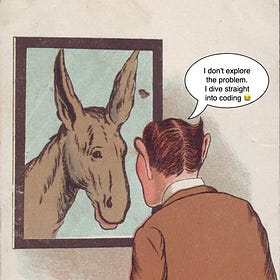Ethical Dilemmas in Coding Interviews: Should You Reveal Prior Knowledge?
Hey there, welcome back to my newsletter, where I share crucial coding interview tips to help you ace your coding interviews. 🚀
Before we dive into today’s topic, take a moment to explore our recent editions, where I discuss cultivating the right mindset for coding interviews and choosing the ideal programming language for interview solutions. 😊
Nailing Coding Interviews: Mindset Matters
Hey there, awesome readers! This time, my newsletter is taking a detour from the usual. It’s also going to be a tad longer, so bear with me. 🚀Thanks for reading Coding Interview Digest! Subscribe for free to receive new posts and support my work. Usually, my posts focus on selecting a problem, like the below
What's the best programming language for coding interviews?
This is the second in a multi part series of articles focused towards sharing insights around coding interview preparation for top tier tech companies. If you haven’t checked out the previous edition, definitely recommend to do so. Today, we dive into a topic that often leaves techies pondering - which programming language should you use in your coding i…
In this post, let's tackle a question that often stumps candidates during their interviews: “Have you seen this question before?” 🤔
Picture this common scenario: You're in the hot seat, working through a coding problem, and suddenly, it hits you—it looks strangely familiar. You've seen it before, maybe even solved it. So, what's the best course of action? Should you be completely honest, or is there a strategic way to navigate this situation? Let's delve into different perspectives on how your answer might shape the course of your interview. 💬
Now, let's assume you've encountered the problem (or part of it) before and are weighing whether or not to admit it. 🤷♂️
Option 1 - Admit that you've seen the problem before 😇
Pros:
Builds Trust: Honesty is a core value in most professional settings. Being upfront about your familiarity with a question builds trust with the interviewer and showcases your integrity. ✅
Opportunity to Shine: In some cases, interviewers may decide to let you solve the problem even if you've seen it before. Your ability to explain the solution effectively, solving it elegantly and swiftly, and demonstrating awareness of the question's nuances could work in your favor. 🌟
Cons:
Question Change: Some interviewers might switch up the question to challenge you. By admitting your prior knowledge, you risk facing a different, unfamiliar question. 🔄
Interviewer Assumptions: Your familiarity with the question might lead the interviewer to assume you've memorized the solution, even if you haven't. 🤨
Higher Success Bar: Knowing that a candidate has already seen the problem could raise the bar for success in the interviewer's eyes. Missing out on edge cases or making mistakes on a problem you're already familiar with might impact your chances more severely than if you'd encountered the problem for the first time. 📈
Option 2 - Don't admit that you've seen the problem before 🙅♂️
Pros:
Smooth Interview: Your knowledge of the problem, its nuances, potential solutions, and optimization techniques can be a massive benefit, helping you excel in the interview. You'll likely breeze through various approaches, handle edge cases, and discuss potential extensions with ease. 😎
Avoid Bias: By not revealing your prior experience, you prevent the interviewer from making assumptions about your knowledge or problem-solving approach. ❌
Cons:
Potential Trust Loss: Interviewers often have questions they know inside out and have asked numerous candidates. They can spot candidates who've encountered the problem before by observing the way the candidate is approaching the problem and handling its nuances. 👀
Potential for Overthinking: Pretending you've never seen the problem before might lead to overthinking. You might spend too much time or create unnecessary complexity. 🤯
Now that we've explored the pros and cons of both options, let me share my perspective on what I'd do in this situation. 🤔
My perspective - The Strategic Angle 💡
Before I dive into my perspective, remember who you are. You're someone who has invested days preparing for your interview, practicing coding questions on weekends, balancing your current job workload and making sacrifices along the way. You've put in immense effort to be well-prepared and secure every advantage you could, not unethically, but through sheer hard work. 💪
So, here's my approach: If I've seen the problem before, and the interviewer asks, I won't jump out of my seat in excitement, announcing that I've solved it previously. 🙌
Instead, I'd probably say, “Well, I’m not sure I've seen this before. Let me work through a few examples to get a better sense of the problem.” 🤷♂️
Some might argue that it's unethical not to admit to having seen the problem before. To them, I'd pose a question: Is it ethical for the interviewer to use your preparation against you by switching the question because you're prepared? 🤨
Remember, you prepared diligently to seize every advantage in the interview, and when your preparation pays off, why not make the most of the opportunity?
Candidates often overestimate how much they remember about a particular problem’s solution. With hundreds of practice questions, some from a long time ago, you might find that while the question seems familiar, you still encounter challenges when attempting to solve it. 🧠
So, assuming you do recall the solution, use this opportunity to explain your understanding thoroughly. Construct your thought process coherently, explore the problem, discuss a brute force approach, highlight its issues, and refine it to an optimal solution. If you've memorized the solution, you might stumble along the way. Use this chance to solve the question ideally—don't overthink, pretend, or fake. Simply explain your entire thought process from start to finish, demonstrating your problem-solving skills, communication, and adaptability. 👩💻
Conclusion: Finding the Balance 🧘♂️
In summary, how you choose to respond to the question, "Have you seen this question before?" during a coding interview can significantly impact your experience and evaluation. Whether you opt for honesty or a strategic approach, always prioritize demonstrating your problem-solving skills and clear communication. Remember, your journey to mastering coding interviews is built on dedication and hard work. Embrace every opportunity to shine. 🌟
If you enjoyed this discussion, be sure to explore our previous editions for more valuable insights and tips. Your coding interview success story continues to unfold, edition by edition. Stay tuned for future nuggets of wisdom! ✨🚀
Want free mock interviews?
Here's how it works: Simply share our newsletter with your friends, colleagues, or anyone you think would love our coding insights. When they subscribe using your unique referral link, you unlock exclusive rewards.
1. Share Coding Interview Digest. When you use the referral link below, or the “Share” button on any post, you'll get credit for any new subscribers. Simply send the link in a text, email, or share it on social media with friends.
2. Earn benefits. When more friends use your referral link to subscribe, you’ll receive special benefits.
Get a free mock coding interview for 10 referrals
Get a 1:1 coding Q&A session for 15 referrals
Get a guest post opportunity for 25 referrals



